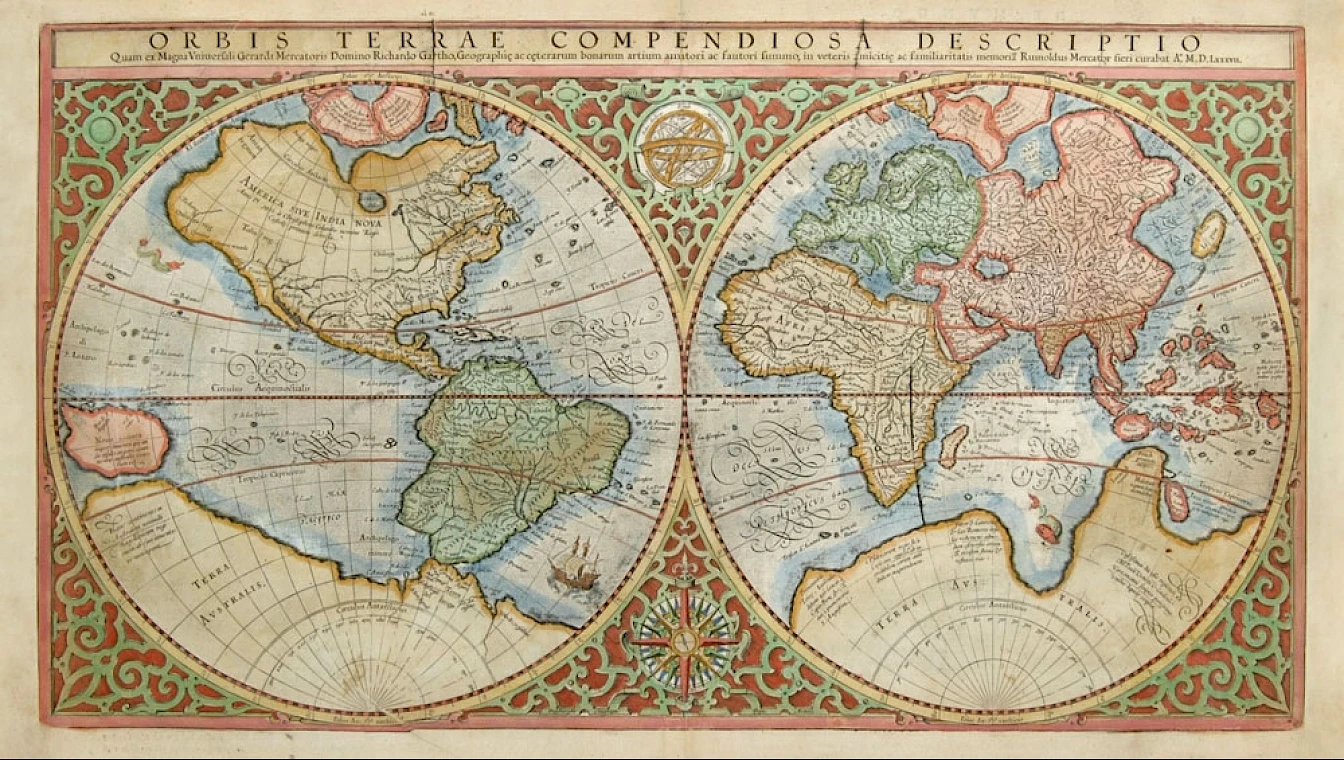
Map made by Rumold Mercator in 1587.
Perhaps, to cite Négritudes pioneer Chinua Achebe, we are all "No Longer At Ease". The precise formation of this discomfort varies along global trajectories of social, subjective and terrestrial relations. Radically subtending the politico-juridical construct of the 'border', these trajectories may better be understood as 'frontiers' that chart ongoing processes of primitive accumulation wherein the common is re-mattered into commodity. As a 'life of lines', in the words of anthropologist Timothy Ingold, frontiers are climactic rather than cartographic—forming meteorological pressure-lines wherein the transformations of solid, liquid and gas occur as political and cosmological transubstantiations.
Frontier Imaginaries is a multi-platform exhibition and research project initiated by Vivian Ziherl during the 2014/2015 IMA Brisbane Curatorial Fellowship. The project departs from Australian dialogues such as climate debates, the offshoreing and enclosure of asylum seekers, ongoing Indigenous struggles, and urban-rural divides within a knowledge economy—resurveying the role of aesthetic work within these increasingly urgent negotiations. Over the coming months, a series of interviews published on L'Internationale Online blog will develop a body of research towards this project and in response to the proposed thematic of Decolonising Practices. Topics will include: 'Decolonising Golan', 'Decolonising Brunswick', 'Decolonising the Household', and 'Decolonising Poetics' for example.
...
The 'frontier' as a horizon did not disappear with the passing of the cart and wagon. Indeed when liberal ideologues are called upon to defend the ever greater exceptions needed to enforce an increasingly tenuous 'rule of law' at both international and state levels, the Wild West is often hailed as the ultimate disciplining threat—a fantasized primitive condition of so-called 'natural law', We must submit, we are told, to the excesses of corporate-state monopolies, or else we're in cowboy-land. But what in-fact is this illibearl terrain of unrule, and what if it is not 'natural' but produced?
Frontier Imaginaries seeks modes and protagonists by which to narrate the frontier as a socio-terrestrial form through imperial histories and within the global era. From the 1500s the frontier expanded across the Mercator projection as a line marking knowable-as-exploitatable. In this way the imperial frontier was also the horizon towards which modernity pitched itself as an improving force of history, forming a geo-temporal cut before which lay the 'primitive', the 'ahistoric', the 'backwards' etc. As feminist researchers such as Silvia Federici have shown, incorporation into coercive industrial modernity acts not only upon lands but upon the intimate politics of populations, and particularly upon the bodies and worlds of women who must be disciplined to re-produce the conditions of their own subjugation.
Through the 19th and 20th Centuries the imperial frontier gradually collapsed into global enclosure, overwritten by data grids as exploratory routes of conquest were exhausted and replaced with the channels of commerce and commutership. How, then, may the global frontier be charted as a reterritorialising imperative within industrial and post-Fordist schema? How may these forces be known, and how may resilience be figured, as capital continues with ever more intensity to exile its incomensurabilites onto outer locations, now marked doubly by the extraction of value and by what Paula Chakravartty and Denise Ferreira da Silva call "the dispossession of the dispossessed".